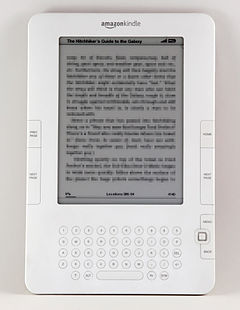 The world in which Rory Cellan-Jones exists is an interesting place. It's one which often results in a good, hard slap to the face. He can always be relied upon for some cynicism and negativity (or realism?) in his analysis of new technologies and tech related businesses. (See the last posting about Google Wave, for example.) This can be unexpected, often because he sees through the hype or aesthetics of many technologies and evaluates stuff based squarely on utilitarian principles. His overview of the Kindle is no exception to this rule:
The world in which Rory Cellan-Jones exists is an interesting place. It's one which often results in a good, hard slap to the face. He can always be relied upon for some cynicism and negativity (or realism?) in his analysis of new technologies and tech related businesses. (See the last posting about Google Wave, for example.) This can be unexpected, often because he sees through the hype or aesthetics of many technologies and evaluates stuff based squarely on utilitarian principles. His overview of the Kindle is no exception to this rule:"The Kindle looks to me like an attractive but expensive niche product, giving a few techie bibliophiles the chance to take more books on holiday without incurring excess baggage charges. But will it force thousands of bookshops to close and transform the economics of struggling newspapers? Don't bet on it."The thing is, Cellan-Jones often talks a lot of sense. To be sure, the Kindle looks like an extremely smart piece of kit, but when Cellan-Jones stacks up the realities of the Kindle one wonders whether it'll be the game changer everyone is expecting it to be.
The focus for the Kindle seems to be on the best seller lists and the broad sheets. An area which appears to have eluded adequate exposition by all the tech commentators is the use of this new generation of e-book readers to deliver text books, learning materials, etc. This was always considered an important area for the early e-book readers. Why carry lots of heavy text books around when you could have them all on your Kindle or Sony Reader Touch, and be in a position to browse and search the content therein more effectively? Or, is this an extravagant use of E-Ink? E-Ink is required for lengthy reading sessions (i.e. novel) rather than dipping in and out of text books to complete academic tasks, something for which a netbook or mobile device might be better. So what happens to the future of e-book readers in academia?
I'd like to have an ebook reader for all the papers and articles I should be reading and all the books I'm using to check if I'm talking nonsense in lectures. Do you think there is a budget for this I think we'd see a bigger turnout at the november reading group meeting if ebook readers were handed out. I'd be prepared to fill in a questionnaire and everything
ReplyDeleteA review of the Kindle in the Guardian Technology pages. A good pros and cons review...
ReplyDelete